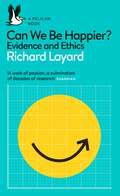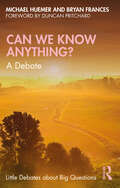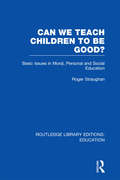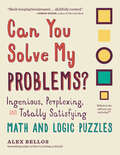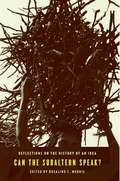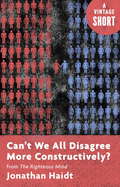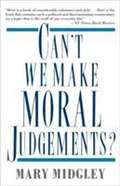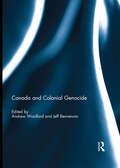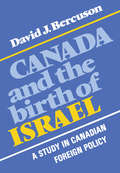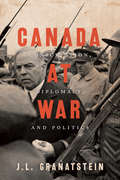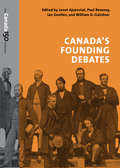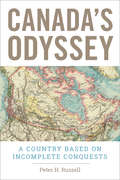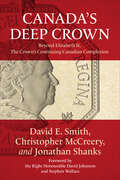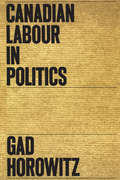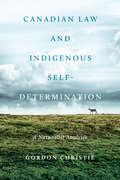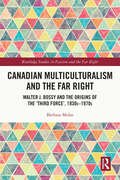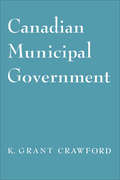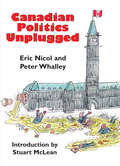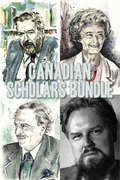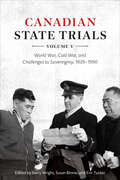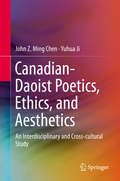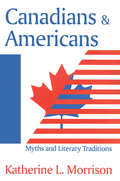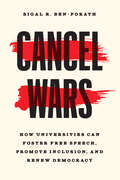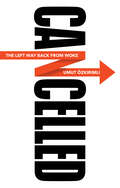- Table View
- List View
Can We Be Happier?: Evidence and Ethics (Pelican Books)
by Richard Layard George WardFrom the bestselling author of Happiness and co-editor of the annual World Happiness ReportMost people now realize that economic growth, however desirable, will not solve all our problems. Instead, we need a philosophy and a science which encompasses a much fuller range of human need and experience.This book argues that the goal for a society must be the greatest possible all-round happiness, and shows how each of us can become more effective creators of happiness, both as citizens and in our own organizations.Written with Richard Layard's characteristic clarity, it provides hard evidence that increasing happiness is the right aim, and that it can be achieved. Its language is simple, its evidence impressive, its effect inspiring.'In this book 'Can We Be Happier?' which is part of Richard Layard's excellent, ongoing exploration of what happiness is and how it can be achieved, he provides evidence that if you have peace of mind and are full of joy, your health will be good, your family will be happy and that happiness will affect the atmosphere of the community in which you live.' The Dalai Lama
Can We Know Anything?: A Debate (Little Debates about Big Questions)
by Michael Huemer Bryan FrancesIn this book, Michael Huemer and Bryan Frances debate whether – and how – we can gain knowledge of the world outside of our own minds. Starting with opening statements, the debate moves through two rounds of replies. Frances argues that we lack knowledge because, for example, we cannot rule out the possibility that we are brains in vats being artificially stimulated in such a way as to create an illusion of living in the real world. Huemer disagrees that we need evidence against such possibilities in order to gain knowledge of the external world, maintaining instead that we are entitled to presume that things are as they appear unless and until we acquire specific grounds for thinking otherwise. The authors go on to discuss how one should think about controversial issues wherein the experts persistently disagree. Frances argues that we should generally withhold judgment about such issues or at least greatly reduce our confidence. Huemer agrees that people are often overconfident about controversial issues but tries to carve out exceptions wherein one can rationally hold on to controversial views. Accessible whilst also detailed and substantial, this thoughtful debate is suitable for readers at all levels, from those encountering the topic for the first time through those who are deeply familiar with the issues. Key Features: Showcases arguments from two leading philosophers in standard form and in clear language Presents definitions in an easily accessible form Summary boxes recap key arguments Includes an annotated bibliography and glossary of all specialized vocabulary
Can We Teach Children to be Good? (Routledge Library Editions: Education)
by Roger StraughanThe apparently straightforward question 'Can we teach children to be good?' cannot be properly understood without a great deal of careful thinking about the philosophical issues involved. Teachers and parents often assume that what the question means and how it should be answered are self-evidently matters of plain 'commonsense', but the dangers of such assumptions are laid bare by the probing approach of this book. After reflecting on the terms 'goodness' and 'teaching' it proceeds to describe and critically examine a number of attempts to define the nature of morality in terms of its form or its content, thereby teasing out the many conflicting views of moral education which follow from these theories. No one account of morality or 'moral education' is found to be wholly satisfactory and a synthesis is offered in the final chapter, which suggests a variety of practical teaching strategies.
Can You Solve My Problems?: Ingenious, Perplexing, And Totally Satisfying Math And Logic Puzzles (Alex Bellos Puzzle Books #0)
by Alex BellosPuzzle lovers, rejoice! Bestselling math writer Alex Bellos has a challenge for you: 125 of the world’s best brainteasers from the last two millennia. Armed with logic alone, you’ll detect counterfeit coins, navigate river crossings, and untangle family trees. Then—with just a dash of high school math—you’ll tie a rope around the Earth, match wits with a cryptic wizard, and use four 4s to create every number from 1 to 50. (It can be done!) The ultimate casebook for daring puzzlers, Can You Solve My Problems? also tells the story of the puzzle—from ancient China to Victorian England to modern-day Japan. Grab your pencil and get puzzling!
Can the Subaltern Speak?: Reflections on the History of an Idea
by Rosalind MorrisGayatri Chakravorty Spivak's original essay "Can the Subaltern Speak?" transformed the analysis of colonialism through an eloquent and uncompromising argument that affirmed the contemporary relevance of Marxism while using deconstructionist methods to explore the international division of labor and capitalism's "worlding" of the world. Spivak's essay hones in on the historical and ideological factors that obstruct the possibility of being heard for those who inhabit the periphery. It is a probing interrogation of what it means to have political subjectivity, to be able to access the state, and to suffer the burden of difference in a capitalist system that promises equality yet withholds it at every turn.Since its publication, "Can the Subaltern Speak?" has been cited, invoked, imitated, and critiqued. In these phenomenal essays, eight scholars take stock of the effects and response to Spivak's work. They begin by contextualizing the piece within the development of subaltern and postcolonial studies and the quest for human rights. Then, through the lens of Spivak's essay, they rethink historical problems of subalternity, voicing, and death. A final section situates "Can the Subaltern Speak?" within contemporary issues, particularly new international divisions of labor and the politics of silence among indigenous women of Guatemala and Mexico. In an afterword, Spivak herself considers her essay's past interpretations and future incarnations and the questions and histories that remain secreted in the original and revised versions of "Can the Subaltern Speak?"-both of which are reprinted in this book.
Can't We All Disagree More Constructively?: from The Righteous Mind
by Jonathan HaidtA Vintage Shorts Selection As America descends deeper into polarization and paralysis, social psychologist Jonathan Haidt has done the seemingly impossible--he has explained the origins of morality, politics, and religion in a way that speaks to everyone on the political spectrum. Drawing on twenty-five years of groundbreaking research, Haidt shows why liberals, conservatives, and libertarians have such different intuitions about right and wrong, and why we need the insights of each if we are to flourish as a nation. Here is the key to understanding the miracle of human cooperation and the eternal curse of moralistic aggression, across the political divide and around the world. An ebook short.
Can't We Make Moral Judgements?
by Mary MidgleyIn this book, Mary Midgely turns a spotlight on the fashionable view that we no longer need or use moral judgements. She shows how the question of whether or not we can make moral judgements must inevitably affect our attitudes to the law and its institutions, but also to events that occur in our daily lives.
Canada and Colonial Genocide
by Andrew Woolford and Jeff BenvenutoSettler colonialism in Canada has traditionally been portrayed as a gentler, if not benevolent, colonialism—especially in contrast to the Indian Wars in the United States. This national mythology has penetrated into comparative genocide studies, where Canadian case studies are rarely discussed in edited volumes, genocide journals, or multi-national studies. Indeed, much of the extant literature on genocide in Canada rests at the level of self-justification, whereby authors draw on the U.N Genocide Convention or some other rubric to demonstrate that Canadian genocides are a legitimate topic of scholarly concern.In recent years, however, discussion of genocide in Canada has become more pronounced, particularly in the wake of the findings of the Truth and Reconciliation Commission of Canada. This volume contributes to this ongoing discourse, providing scholarly analyses of the multiple dimensions or processes of colonial destruction and their aftermaths in Canada. Various acts of genocidal violence are covered, including residential schools, repressive legal or governmental controls, ecological destruction, and disease spread. Additionally, contributors draw comparisons to patterns of colonial destruction in other contexts, examine the ways in which Canada has sought to redress and commemorate colonial harms, and present novel theoretical and conceptual insights on colonial/settler genocides in Canada. This book was previously published as a special issue of the Journal of Genocide Research.
Canada and the Birth of Israel
by David Jay BercusonCanadian Zionists of the 1930s were anxious to involve their government in the Palestine question. The pressure they brought to bear was fuelled by a new urgency when British policy in Palestine denied entry to Jewish refugees from the Nazi terror. Today there is a widely held impression that the Canadian government responded quickly and sympathetically to that pressure. Jews and Arabs alike, each for their own purposes, have created the image of a Canada friendly to Zionism, and of Canadian policy directed by such pro-Zionists as Lester Pearson.But as David Bercuson demonstrates, the truth is far more complex. In fact, Zionist efforts to involve Canada in the Palestine question met with considerable resistance from Ottawa, even when Canada was elected to membership on the United Nations Special Committee on Palestine in 1947. The partition of Palestine was eventually supported by Canada, but begrudgingly. Ottawa viewed partition as the 'least lousy' solution to a problem that was acutely sensitive both diplomatically and politically.Hardly the champions of Zionism that it has generally been considered, Canada is revealed in Bercuson's study as having established a middle east policy, not on moral or ideological grounds, but on the basis of the politicians' view of its own national interests.
Canada at War: Conscription, Diplomacy, and Politics (G - Reference,information And Interdisciplinary Subjects Ser.)
by J.L. GranatsteinWar can subject nations and their peoples to immense strain, and the dangers both tear societies apart and transform attitudes at a great pace. In this collection of his previously published essays on the two world wars, J.L. Granatstein brings together research from archives in Canada and abroad, illuminating Canada’s political transition from the British to American sphere of influence in the first half of the twentieth century. Canada at War examines the impact of both world wars on Canada and Canadians by examining conscription, foreign policy, and politics, with William Lyon Mackenzie King, Canada’s longest-serving prime minister, acting as the book’s central figure. Mackenzie King knew that Canada had barely survived the conscription crisis of the Great War, and he strove to avoid similar political strains in the Second World War. In Canada at War, Granatstein reflects on the most significant issues affecting Canadians during the wars, showing how this period ushered change into the Canadian landscape and transformed Canada into the country that it is today.
Canada's Founding Debates
by Janet Ajzenstat Ian Gentles Paul Romney William GairdnerCanada's Founding Debates is about Confederation—about the process that brought together six out of the seven territories of British North America in the years 1864-73 to form a country called Canada. It presents excerpts from the debates on Confederation in all of the colonial parliaments from Newfoundland to British Columbia and in the constituent assembly of the Red River Colony. The voices of the powerful and those of lesser note mingle in impassioned debate on the pros and cons of creating or joining the new country, and in defining its nature. In short explanatory essays and provocative annotations, the editors sketch the historical context of the debates and draw out the significance of what was said. By organizing the debates thematically, they bring out the depth of the founders' concern for issues that are as vital today as they were then: the meaning of liberty, the merits of democracy, the best form of self-government, the tension between collective and individual rights, the rule of law, the requirements of political leadership, and, of course, the nature of Canadian nationality. Canada's Founding Debates offers a fresh and often surprising perspective on Canada's origins, history, and political character. Previously published by Stoddart Publishing, 1999.
Canada's Odyssey: A Country Based on Incomplete Conquests
by Peter H. Russell150 years after Confederation, Canada is known around the world for its social diversity and its commitment to principles of multiculturalism. But the road to contemporary Canada is a winding one, a story of division and conflict as well as union and accommodation. In Canada’s Odyssey, renowned scholar Peter H. Russell provides an expansive, accessible account of Canadian history from the pre-Confederation period to the present day. By focusing on what he calls the "three pillars" of English Canada, French Canada, and Aboriginal Canada, Russell advances an important view of our country as one founded on and informed by "incomplete conquests". It is the very incompleteness of these conquests that have made Canada what it is today, not just a multicultural society but a multinational one. Featuring the scope and vivid characterizations of an epic novel, Canada’s Odyssey is a magisterial work by an astute observer of Canadian politics and history, a perfect book to commemorate the 150th anniversary of Confederation.
Canada’s Deep Crown: Beyond Elizabeth II, The Crown’s Continuing Canadian Complexion
by David Smith Christopher McCreery Jonathan ShanksThe Crown in Canada has had a profound influence in shaping a country and a constitution that embraces the promotion of political moderation, societal accommodation, adaptable constitutional structures, and pluralistic governing practices. While none of these features themselves originated through legislative or constitutional action, David E. Smith, Christopher McCreery, and Jonathan Shanks propose that all reflect the presence and actions of the Crown. Examining how a constitutional monarchy functions, Canada’s Deep Crown discusses how the legal and institutional abstractions of the Crown vary depending on the circumstances and the context in which it is found. The Crown presents differently depending on who is observing it, who is representing it, and what role it is performing. With a focus on the changes that have taken place over the last fifty years, this book addresses the role of the Crown in dispersing power throughout Canada’s system of government, the function the sovereign, governor general, and lieutenant governors play, and how the demise of the Crown and transition to a new sovereign is likely to unfold.
Canadian Labour in Politics
by Gad HorowitzThis important new study in Canadian politics discusses the role of socialism in Canada. By means of comparison between the English-Canadian and the American political importance of socialism in Canada than the United States. In this section Louis Hartz's theory of "fragment" cultures is carried forward and applied to Canada. The remainder of the book is devoted to a detailed historical study of the relationship between the labour movement and the socialist parties in Canada. It starts in the early years of the century and follows the story through to its significant conclusion—the support (and formation) by many Canadian unions of a labour party. The brilliant analysis of Canadian politics in Hartzian terms restores ideology to a place in our political culture, and the meticulous, objective recounting of labour's involved in the formation of the NDP is a timely and valuable contribution to our limited understanding of how Canadian political parties "live and move and have their being." The main sources used by the author were correspondence, minutes, and other materials in the files of the NDP and the Canadian Labour Congress, and personal interviews with labour leaders and socialist politicians. (Studies in the Structure of Power: Decision Making in Canada No. 4.)
Canadian Law and Indigenous Self‐Determination: A Naturalist Analysis
by Gordon ChristieFor centuries, Canadian sovereignty has existed uneasily alongside forms of Indigenous legal and political authority. Canadian Law and Indigenous Self-Determination demonstrates how, over the last few decades, Canadian law has attempted to remove Indigenous sovereignty from the Canadian legal and social landscape. Adopting a naturalist analysis, Gordon Christie responds to questions about how to theorize this legal phenomenon, and how the study of law should accommodate the presence of diverse perspectives. Exploring the socially-constructed nature of Canadian law, Christie reveals how legal meaning, understood to be the outcome of a specific society, is being reworked to devalue the capacities of Indigenous societies. Addressing liberal positivism and critical postcolonial theory, Canadian Law and Indigenous Self-Determination considers the way in which Canadian jurists, working within a world circumscribed by liberal thought, have deployed the law in such a way as to attempt to remove Indigenous meaning-generating capacity.
Canadian Multiculturalism and the Far Right: Walter J. Bossy and the Origins of the ‘Third Force’, 1930s–1970s (Routledge Studies in Fascism and the Far Right)
by Bàrbara MolasCanadian Multiculturalism and the Far Right examines a neglected aspect of the history of 20th century Canadian multiculturalism and the far right to illuminate the ideological foundations of the concept of ‘third force’. Focusing on the particular thought of ultra-conservative Ukrainian Canadian Walter J. Bossy during his time in Montreal (1931–1970s), this book demonstrates that the idea that Canada was composed of three equally important groups emerged from a context defined by reactionary ideas on ethnic diversity and integration. Two broad questions shape this research: first, what the meaning originally attached to the idea of a ‘third force’ was, and what the intentions behind the conceptualization of a trichotomic Canada were; and second, whether Bossy’s understanding of the ‘third force’ precedes, or is related in any way to, postwar debates on liberal multiculturalism at the core of which was the existence of a ‘third force’. This book will be of interest to students and researchers of multiculturalism, radical-right ideology and the far right, and Canadian history and politics.
Canadian Municipal Government
by Kenneth CrawfordThe student who would understand the government of a country can only obtain a complete knowledge of it if he knows something of the government of its local subdivisions. Yet the Canadian student will find studies of Canadian local government almost non-existent. Similarly the citizen or municipal officer looking for details of the organization and operation of the several systems of local government in Canada needs, but has not yet had, one single source with all the information on the subject gathered together in readily available form. Mr. Crawford meets both needs in his excellent study, the sixth volume in the Canadian Government Series. Since local government in Canada comes under provincial jurisdiction, there are ten distinct systems having many similarities and diversities. Mr. Crawford's aim is to show how various Canadian municipal systems function, rather than to present a critical analysis of existing institutions and practices. But first he discusses the necessity of local government, its practical and political importance, the degree of self-government involved in local government and the factors contributing to this, and the weak constitutional position of local government, a position offset by the needs of the community, needs which can be best met by local government and which assure the continuance of that government despite the tightening of central control by province and nation.
Canadian Politics Unplugged
by Eric Nicol Peter WhalleyCanadian politics is/are not well understood, no authority being prepared to say whether it/they is/are singular or plural. Canadian Politics Unplugged bravely breaks new ground in ignoring this question. The book concentrates on the central problem of democracy in a country that is too big to digest without getting gas.Readers are assured that the authors have studied Canadian politics for years, from a safe distance, and enjoy the unique perspective of never having been elected to high office, low office, or any place where wearing shoes is mandatory.Canadian Politics Unplugged is Whalley and Nicol’s fifth successful collaboration.
Canadian Scholars Bundle: Lucille Teasdale / Robertson Davies / George Grant / Marshall McLuhan
by T. F. Rigelhof Nicholas Maes Deborah Cowley Judith FitzgeraldPresenting four titles in the Quest Biography series that profiles prominent people in Canada’s history. In these books we explore Canada’s rich academic and philosophical history through the fascinating lives of some of its most influential figures. Profiled are: prescient media guru Marshall McLuhan, physician Lucille Teasdale, political philosopher George Grant, and novelist and literary theorist Robertson Davies. Includes: George Grant, Lucille Teasdale, Marshall McLuhan, and Robertson Davies.
Canadian State Trials, Volume V: World War, Cold War, and Challenges to Sovereignty, 1939–1990 (Osgoode Society for Canadian Legal History)
by Wright, Tucker, and BinnieThe fifth and final volume of the Canadian State Trials series examines political trials and national security measures during the period of 1939 to 1990. Essays by historians and legal scholars shed light on experiences during the Second World War and its immediate aftermath, including uses of the War Measures Act and the Official Secrets Act with the unfolding of the Cold War and legal responses to the FLQ (including the October Crisis), labour strikes, and Indigenous resistance and standoffs. The volume critically examines the historical and social context of the trials and measures resulting from these events, concluding the first comprehensive series on this important area of Canadian law and politics. The fifth volume’s exploration of state responses to real and perceived security threats is particularly timely as Canada faces new challenges to the established order ranging from Indigenous nations demanding a new constitutional framework to protestors challenging discriminatory policing and contesting public health measures. (Osgoode Society for Canadian Legal History)
Canadian-Daoist Poetics, Ethics, and Aesthetics: An Interdisciplinary and Cross-cultural Study
by John Z. Ming Chen Yuhua JiThis monograph takes an interdisciplinary and cross-cultural approach to 20th and 21st -century Canadian Daoist poetry, fiction and criticism in comparative, innovative and engaging ways. Of particular interest are the authors' refreshing insights into such holistic and topical issues as the globalization of concepts of the Dao, the Yin/Yang, the Heaven-Earth-Humanity triad, the Four Greats, Five Phases, Non-action and so on, as expressed in Canadian literature and criticism - which produces Canadian-constructed Daoist poetics, ethics and aesthetics. Readers will come to understand and appreciate the social and ecological significance of, formal innovations, moral sensitivity, aesthetic principles and ideological complexity in Canadian-Daoist works.
Canadians and Americans: Myths and Literary Traditions
by Katherine L. MorrisonMuch can be learned from a nation's literature. Examining three hundred years of cultural traditions, Katherine L. Morrison, a former American, now a Canadian, takes the reader through the historical, political, and sociological milieu of Canada and the United States to dispel misconceptions that they share near-identical social attitudes and historical experiences.To most Americans and much of the rest of the world, America and Canada differ little except in terms of climate. It is true that they share a common British heritage and immigration patterns, but there are subtle cultural differences between the two countries. These may appear insignificant to Americans, but they are not insignificant to Canadians. Comparing mythologies each of the countries share about the other, the author examines national views of their histories, from the common origin of both nations in the American Revolution, through the two world wars. She also examines the role of nature and images of place and home in Canadian and American literary writing, noting the disparate historical development of the two national literatures. Using specific works by recognized authors of their time, Morrison considers the role of religion and the church, violence and the law, and humor and satire, in the literature of both countries. The book also explores the role of women, race, and class in the literature of both countries. It concludes with a discussion of the tenacity of national myths, and draws some tentative conclusions.Now published in paperback in the United States, Morrison's broad-based approach to a largely unexplored subject will invite future study as well as improve understanding between Canada and the United States. Canadians and Americans will be of interest to cultural historians, American studies specialists, political scientists, and sociologists.
Cancel Wars: How Universities Can Foster Free Speech, Promote Inclusion, and Renew Democracy
by Sigal R. Ben-PorathAn even-handed exploration of the polarized state of campus politics that suggests ways for schools and universities to encourage discourse across difference. College campuses have become flashpoints of the current culture war and, consequently, much ink has been spilled over the relationship between universities and the cultivation or coddling of young American minds. Philosopher Sigal R. Ben-Porath takes head-on arguments that infantilize students who speak out against violent and racist discourse on campus or rehash interpretations of the First Amendment. Ben-Porath sets out to demonstrate the role of the university in American society and, specifically, how it can model free speech in ways that promote democratic ideals. In Cancel Wars, she argues that the escalating struggles over “cancel culture,” “safe spaces,” and free speech on campus are a manifestation of broader democratic erosion in the United States. At the same time, she takes a nuanced approach to the legitimate claims of harm put forward by those who are targeted by hate speech. Ben-Porath’s focus on the boundaries of acceptable speech (and on the disproportional impact that hate speech has on marginalized groups) sheds light on the responsibility of institutions to respond to extreme speech in ways that proactively establish conversations across difference. Establishing these conversations has profound implications for political discourse beyond the boundaries of collegiate institutions. If we can draw on the truth, expertise, and reliable sources of information that are within the work of academic institutions, we might harness the shared construction of knowledge that takes place at schools, colleges, and universities against truth decay. Of interest to teachers and school leaders, this book shows that by expanding and disseminating knowledge, universities can help rekindle the civic trust that is necessary for revitalizing democracy.
Cancelled: The Left Way Back from Woke
by Umut OzkirimliRight now, someone, somewhere is being cancelled. Off-the-cuff tweets or “harmless” office banter have the potential to wreck lives. The Left condemns the Right, and the bigotry of the old elites. The Right complains about brain-dead political correctness, and the erosion of liberal values. In reality, both sides are colluding in a reactionary, exclusionary politics that is as self-defeating as it is divisive. Can the Left escape this extremism and stay true to the progressive ideals it once professed? In this provocative book, Umut Özkırımlı reveals how the Left has been sucked into a spiral of toxic hatred and outrage-mongering, retreating from the democratic ideals of freedom, tolerance and pluralism that it purports to represent. Exploring the similarities between right-wing populism and radical identity politics, he sets out an alternative vision. It is only by focusing on our common humanity and working across differences that the Left will successfully find a constructive and consensual way back from “woke”.
Cancer Stem Cells: Philosophy and Therapies
by Lucie LaplaneA new therapeutic strategy could break the stalemate in the war on cancer by targeting not all cancerous cells but the small fraction that lie at the root of cancers. Lucie Laplane offers a comprehensive analysis of cancer stem cell theory, based on an original interdisciplinary approach that combines biology, biomedical history, and philosophy.
